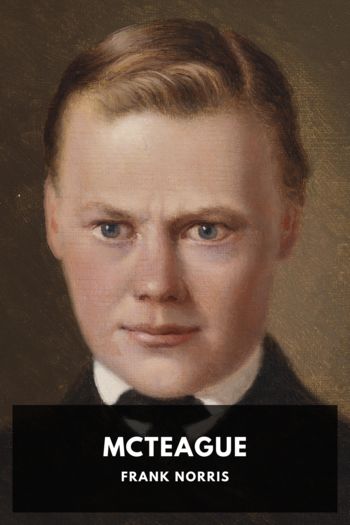McTeague, Frank Norris [polar express read aloud .txt] 📗

- Author: Frank Norris
Book online «McTeague, Frank Norris [polar express read aloud .txt] 📗». Author Frank Norris
McTeague had relapsed to his wonted stolidity. He never questioned himself, never looked for motives, never went to the bottom of things. The year following upon the summer of his marriage was a time of great contentment for him; after the novelty of the honeymoon had passed he slipped easily into the new order of things without a question. Thus his life would be for years to come. Trina was there; he was married and settled. He accepted the situation. The little animal comforts which for him constituted the enjoyment of life were ministered to at every turn, or when they were interfered with—as in the case of his Sunday afternoon’s nap and beer—some agreeable substitute was found. In her attempts to improve McTeague—to raise him from the stupid animal life to which he had been accustomed in his bachelor days—Trina was tactful enough to move so cautiously and with such slowness that the dentist was unconscious of any process of change. In the matter of the high silk hat, it seemed to him that the initiative had come from himself.
Gradually the dentist improved under the influence of his little wife. He no longer went abroad with frayed cuffs about his huge red wrists—or worse, without any cuffs at all. Trina kept his linen clean and mended, doing most of his washing herself, and insisting that he should change his flannels—thick red flannels they were, with enormous bone buttons—once a week, his linen shirts twice a week, and his collars and cuffs every second day. She broke him of the habit of eating with his knife, she caused him to substitute bottled beer in the place of steam beer, and she induced him to take off his hat to Miss Baker, to Heise’s wife, and to the other women of his acquaintance. McTeague no longer spent an evening at Frenna’s. Instead of this he brought a couple of bottles of beer up to the rooms and shared it with Trina. In his Parlors he was no longer gruff and indifferent to his female patients; he arrived at that stage where he could work and talk to them at the same time; he even accompanied them to the door, and held it open for them when the operation was finished, bowing them out with great nods of his huge square-cut head.
Besides all this, he began to observe the broader, larger interests of life, interests that affected him not as an individual, but as a member of a class, a profession, or a political party. He read the papers, he subscribed to a dental magazine; on Easter, Christmas, and New Year’s he went to church with Trina. He commenced to have opinions, convictions—it was not fair to deprive taxpaying women of the privilege to vote; a university education should not be a prerequisite for admission to a dental college; the Catholic priests were to be restrained in their efforts to gain control of the public schools.
But most wonderful of all, McTeague began to have ambitions—very vague, very confused ideas of something better—ideas for the most part borrowed from Trina. Some day, perhaps, he and his wife would have a house of their own. What a dream! A little home all to themselves, with six rooms and a bath, with a grass plat in front and calla-lilies. Then there would be children. He would have a son, whose name would be Daniel, who would go to High School, and perhaps turn out to be a prosperous plumber or house painter. Then this son Daniel would marry a wife, and they would all live together in that six-room-and-bath house; Daniel would have little children. McTeague would grow old among them all. The dentist saw himself as a venerable patriarch surrounded by children and grandchildren.
So the winter passed. It was a season of great happiness for the McTeagues; the new life jostled itself into its grooves. A routine began.
On weekdays they rose at half-past six, being awakened by the boy who brought the bottled milk, and who had instructions to pound upon the bedroom door in passing. Trina made breakfast—coffee, bacon and eggs, and a roll of Vienna bread from the bakery. The breakfast was eaten in the kitchen, on the round deal table covered with the shiny oilcloth table-spread tacked on. After breakfast the dentist immediately betook himself to his Parlors to meet his early morning appointments—those made with the clerks and shop girls who stopped in for half an hour on their way to their work.
Trina, meanwhile, busied herself about the suite, clearing away the breakfast, sponging off the oilcloth table-spread, making the bed, pottering about with a broom or duster or cleaning rag. Towards ten o’clock she opened the windows to air the rooms, then put on her drab jacket, her little round turban with its red wing, took the butcher’s and grocer’s books from the knife basket in the drawer of the kitchen table, and descended to the street, where she spent a delicious hour—now in the huge market across the way, now in the grocer’s store with its fragrant aroma of coffee and spices, and now before the counters of the haberdasher’s, intent on a bit of shopping, turning over ends of veiling, strips of elastic, or slivers of whalebone. On the street she rubbed elbows with the great ladies of the avenue in their beautiful dresses, or at intervals she met an acquaintance or two—Miss Baker, or Heise’s lame wife, or Mrs. Ryer. At times she passed the flat and looked up at the windows of her home, marked by the huge golden molar that projected, flashing, from the bay window of the Parlors. She saw the open windows of the sitting-room, the Nottingham lace curtains stirring





Comments (0)